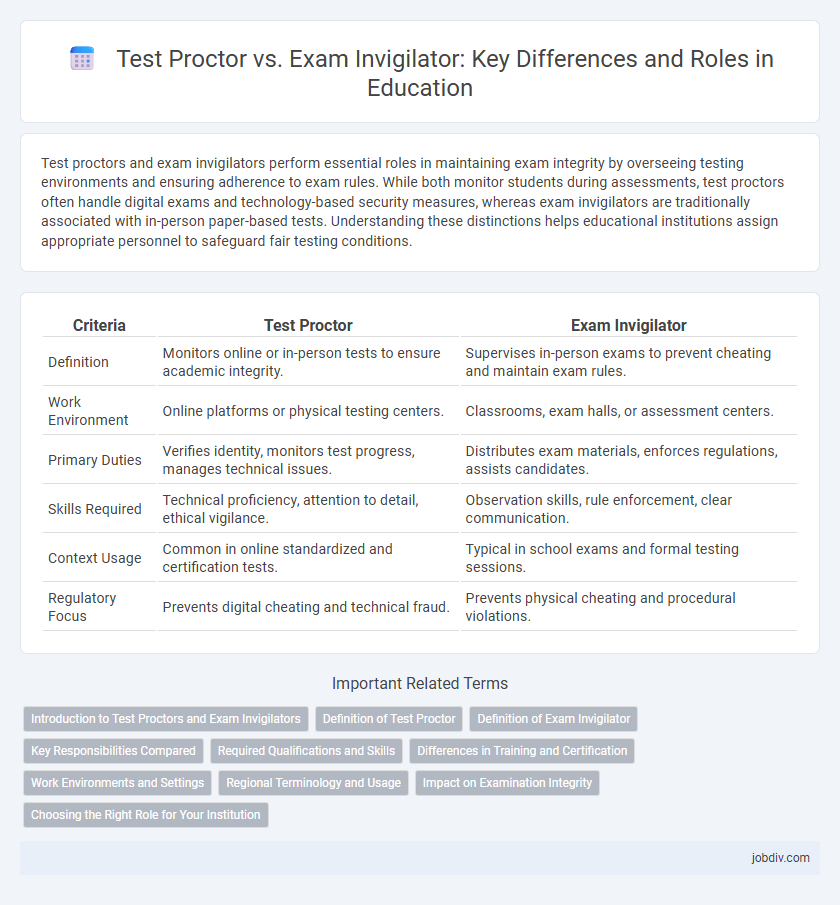Test proctors and exam invigilators perform essential roles in maintaining exam integrity by overseeing testing environments and ensuring adherence to exam rules. While both monitor students during assessments, test proctors often handle digital exams and technology-based security measures, whereas exam invigilators are traditionally associated with in-person paper-based tests. Understanding these distinctions helps educational institutions assign appropriate personnel to safeguard fair testing conditions.
Table of Comparison
| Criteria | Test Proctor | Exam Invigilator |
|---|---|---|
| Definition | Monitors online or in-person tests to ensure academic integrity. | Supervises in-person exams to prevent cheating and maintain exam rules. |
| Work Environment | Online platforms or physical testing centers. | Classrooms, exam halls, or assessment centers. |
| Primary Duties | Verifies identity, monitors test progress, manages technical issues. | Distributes exam materials, enforces regulations, assists candidates. |
| Skills Required | Technical proficiency, attention to detail, ethical vigilance. | Observation skills, rule enforcement, clear communication. |
| Context Usage | Common in online standardized and certification tests. | Typical in school exams and formal testing sessions. |
| Regulatory Focus | Prevents digital cheating and technical fraud. | Prevents physical cheating and procedural violations. |
Introduction to Test Proctors and Exam Invigilators
Test proctors and exam invigilators are essential professionals responsible for supervising examinations to ensure academic integrity and prevent cheating. Test proctors primarily monitor candidates during online or in-person tests, verifying identities and enforcing testing protocols. Exam invigilators oversee the examination environment, maintain order, and assist students with procedural inquiries while ensuring adherence to exam regulations.
Definition of Test Proctor
A test proctor is a professional responsible for monitoring students during examinations to ensure academic integrity and prevent cheating. They administer tests in various settings, verify student identities, and enforce exam rules and regulations. Test proctors play a critical role in maintaining a fair and secure testing environment across educational institutions.
Definition of Exam Invigilator
An exam invigilator is a professional responsible for supervising students during examinations to ensure compliance with testing regulations and prevent cheating. Their duties include verifying student identities, distributing and collecting exam materials, and maintaining a quiet and orderly environment. Unlike test proctors who often monitor online assessments, exam invigilators primarily oversee in-person, formal exams within educational institutions.
Key Responsibilities Compared
Test proctors primarily oversee the administration of online or computerized exams, ensuring test-takers adhere to rules and preventing cheating through remote monitoring tools and identity verification. Exam invigilators focus on supervising in-person exams by distributing materials, maintaining a quiet environment, and reporting any suspicious behavior or irregularities during the test. Both roles require vigilance and enforcement of exam protocols, but the proctor role emphasizes technology use while the invigilator relies on direct physical oversight.
Required Qualifications and Skills
Test proctors typically require a high school diploma or equivalent and possess strong attention to detail, excellent communication skills, and basic technical proficiency to manage computerized testing platforms. Exam invigilators often need formal training or certification in examination procedures, along with skills in time management, integrity, and conflict resolution to maintain a fair testing environment. Both roles demand reliability, confidentiality, and the ability to monitor examinees effectively to prevent cheating.
Differences in Training and Certification
Test proctors typically undergo general training focused on monitoring exam behavior and ensuring test security, while exam invigilators receive formal certification emphasizing standardized procedures and compliance with regulatory standards. Proctor training often includes basic instructions on detecting cheating and emergency protocols, whereas invigilator certification programs cover advanced assessment management, legal responsibilities, and accommodations for special needs students. The depth and formality of training distinguish invigilators as qualified professionals equipped to handle complex examination environments.
Work Environments and Settings
Test proctors typically oversee online or digital exam environments, ensuring academic integrity through remote monitoring software and real-time video surveillance. Exam invigilators usually operate in physical classroom or examination hall settings, supervising students in person to prevent cheating and manage exam administration. Both roles require strict adherence to institutional protocols but differ significantly in their work environments and interaction methods with examinees.
Regional Terminology and Usage
Test proctor and exam invigilator both refer to individuals supervising exams, with "test proctor" primarily used in the United States and Canada, while "exam invigilator" is common in the United Kingdom, Australia, and other Commonwealth countries. The role entails ensuring exam integrity, preventing cheating, and assisting students during assessments. Regional terminology reflects educational system differences, where American institutions emphasize standardized testing and Canadian contexts blend both terms, whereas British and Australian systems align with "invigilator" reflecting their academic traditions.
Impact on Examination Integrity
Test proctors and exam invigilators play crucial roles in maintaining examination integrity by monitoring candidates to prevent cheating and ensuring adherence to exam protocols. Technological advancements have enhanced the capabilities of test proctors, especially in online testing environments, by enabling real-time surveillance and identity verification. The effectiveness of both roles directly influences the credibility of examination results and upholds academic standards across educational institutions.
Choosing the Right Role for Your Institution
Test proctors typically oversee online examinations, ensuring the integrity of remote assessments through digital monitoring tools, while exam invigilators are responsible for supervising in-person exams within a physical classroom setting. Choosing the right role depends on your institution's exam format, technological infrastructure, and student needs, as test proctors leverage software to prevent cheating in virtual environments whereas exam invigilators manage the logistics and discipline during traditional on-site testing. Effective selection aligns with exam security protocols and operational efficiency to maintain academic integrity across various testing environments.
Test Proctor vs Exam Invigilator Infographic

 jobdiv.com
jobdiv.com